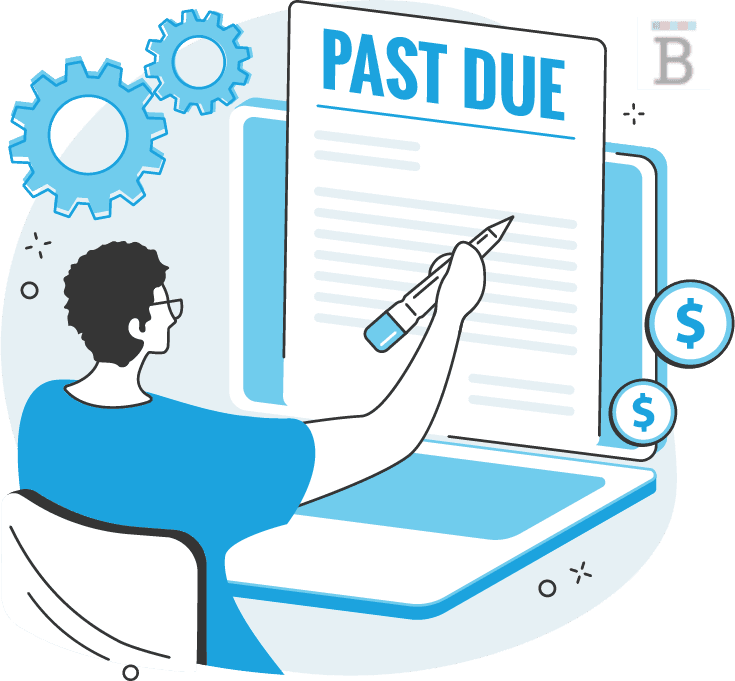It’s one thing if a client pays your most recent invoice a week or two after it’s due; it’s another if you’ve gone months without payment, especially if the invoice is large. If your typical communication channels aren’t succeeding in retrieving your clients’ unpaid debt, you may need to take more formal action.
Debt collection letters should be the first step in your action plan. After you send enough letters, you can transfer the client’s debt to collections, though you may want to exhaust all other options before doing so. Learn more about debt collection letters and the debt collection process below.
Editor’s note: Looking for the right collection agency for your business? Fill out the below questionnaire to have our vendor partners contact you about your needs.
What is a debt collection letter?
A debt collection letter is a formal debt reminder that you send (or hire a collection agency to send) to a nonpaying client. You can send a debt collection letter to a B2B client (another business) or an individual consumer. It’s estimated that about 70 million Americans have a debt in collections each year, according to the Consumer Financial Protection Bureau, so the problem is more common than you might think.

The first couple of debt collection letters you send to a debtor can be relatively friendly and sympathetic. However, as you send additional debt collection letters, you may need to escalate the language to include warnings of impending legal action.
A debt collection letter reminds a nonpaying client of their debt to you or warns of near-future legal action.
What is the purpose of a debt collection letter?
A debt collection letter may serve one, some or all of the following purposes:
- Informing debtors that they owe you money: If this is your goal, your letter should simply remind the client of their debt’s existence and the initial due date. At most, you should gently hint that legal action could happen down the line, because perhaps the debtor doesn’t intend to stonewall you. They might have simply forgotten about your debt or currently lack cash flow but still intend to pay.
- Establishing a payment process: If it does turn out that your debtor is struggling with cash flow, then you can offer a payment plan in your debt collection letter. This way, the debtor doesn’t have to scramble to get you $10,000 at once, for example; instead, you can arrange a 10-month repayment plan of monthly $1,000 installments. That said, be sure that any repayment plan you agree to is as fair for you as it is for the debtor.
- Starting legal proceedings: If your customer’s debt goes unpaid for long enough, you may need to initiate legal proceedings to retrieve it. If you do, you should send a debt collection letter outlining the legal actions that the debtor should expect. If the debtor does not respond promptly with full payment of their debt, you can formally begin the collections process, either by doing it yourself or by hiring a collection agency.
A debt collection letter may inform a debtor of their debt, initiate a repayment plan, preview impending legal proceedings or combine these tasks.
What should be included in a debt collection letter?
A debt collection letter should include the following information:
- The amount the debtor owes you
- The initial due date of the payment
- A new due date for the payment, whether ASAP or in the future
- Instructions on how to pay the debt
- In your first debt collection letter, phrasing that advises the debtor to contact you if the debt has indeed been paid and you are in error
- In the early stages of collection, a friendly but firm reminder that payment is due ASAP
- In the early stages of collection, a note that you would like to retain the client but require payment to do so
- In the late stages of collection, a firm (but not quite unfriendly) warning of impending legal action, such as sending the debtor to collections
- In the late stages of collection, a note that the debtor has the right to dispute their debt via a debt validation letter sent within a given time frame of receiving your debt collection letter
Below, we’ll incorporate all of the above into a sample debt collection letter you can use for your own purposes.
A debt collection letter should include elements such as the debt owed, the initial due date and, if necessary, warnings of impending legal action.
Sample debt collection letter
John Creditor Doe
John Creditor Doe’s address
April 1, 2021
RE: Overdue payment
Dear John Creditor Doe,
[If this is the first or second debt collection letter:] This letter is a reminder [or “another reminder” for a second letter] that a(n) $[amount] balance on your account due on [date] remains unpaid. Please send us your payment [ASAP or within X days of the date at the top of this letter] [insert instructions on how to pay here]. Although we look forward to continuing our business relationship with you, we cannot do so if your balance remains unpaid.
If you have already made this payment, please contact us at [email address or phone number] to rectify this matter. We apologize for any inconvenience this may cause.
[If this is the last collection letter before initiating legal proceedings:] This letter is your final reminder that a(n) $[amount] balance on your account due on [date] remains unpaid. We regret to inform you that if you do not send us your payment immediately by [insert instructions on how to pay here], we will send your balance to collections. A debt in collections can seriously affect your credit score, so we advise you to pay immediately.
If you would like to dispute this debt, you can legally do so with a letter of debt validation submitted within [time frame] of the date listed at the top of this letter. If you do not file a letter of validation within this time frame, it will be assumed that you agree for your debt to be sent to collections.
Sincerely,
[Your name]
[Your position]
[Your company name]
When to hire a debt collection agency
After sending a final debt collection letter that warns of legal action, you may want to hire a debt collection agency to recover the debt. Both small businesses and freelancers with nonpaying clients can hire these agencies. Their debt collection experts will handle the collection process on your behalf, allowing you to focus on your usual work.

That said, collection agencies should always be your last resort, as they can be quite expensive. Generally, when you send a debt to collections, the agency will keep a substantial fraction of the debt as its payment, so agencies are often unsuitable for collecting small debts. Additionally, sending a client’s debt to collections is a surefire way to sever ties with that client, so be sure you’re willing to burn that bridge before you take any action.
If you do decide to hire a debt collection agency, consult our collection agency reviews. Our reviews highlight the best collection agencies for small businesses, business-to-business collections, business-to-consumer collections and low-cost services so you can receive your debts with as little hassle as possible.
A debt collection letter is the first step to recovering what you’re owed
It can be daunting to confront a client that’s late on their payment, but it’s necessary to establish a paper trail of communications. Whether you send your debt collection letter via email or certified mail, it’s important to track whether the debtor indeed received the communication.
In many cases, this reminder will be enough for them to pay the balance owed or at least set up a payment plan. In other cases, it shows you’ve done your due diligence in trying to collect the debt and work with the party that owes you money. That will be important if you ultimately need to send the debt to collections or file a suit in small claims court. With luck and a well-drafted letter, though, it may not come to that.











